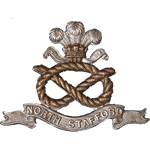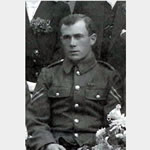Commemorated: | |||
| 1. Memorial: | Basra Memorial | Panel 34. Basra | |
| 2. Memorial: | The (1940) Scroll - WW1 Roll of Honour | 9A GQS | |
Awards & Titles: | |||
Family :
George Powell was born in June 1886 in Burntwood, Staffordshire, England, and is the son of Thomas and Amy Powell of 5 Greenhaugh Row, Beacon St, Lichfield, England. He was married on 26 August 1915 to Alice Elizabeth Clift of Johnson Hall, Eccleshall, Staffordshire. He enlisted at Lichfield, England along with his brother, John William Powell who was also killed in the Great War.Service Life:
Campaigns:
- The First World War 1914-1918, World-wide.
| Unit / Ship / Est.: North Staffordshire Regiment |
| Action : Mesopotamia |
At the outbreak of war the British, together with Indian troops, resolved to protect oil supply in the region by occupying the area around Basra at Abadan. This evolved into a series of campaigns towards Baghdad against the Turkish forces as Mesopotamia (modern Iraq) was part of the Ottoman Empire. Meetings in late 1914 and into 1915 led the Viceroy and Indian government at Simla to reconsider the limited involvement of troops and they decided to order further advances with a view to securing the Shatt-al-Hai, a canal connecting the Tigris and Euphrates river and potentially capturing Baghdad. The British government disagreed and wished to conserve forces for the Western front. The Viceroy was given permission to act as it wished, but told in no uncertain terms that no reinforcements should be expected.
The initial success experienced by the British and Indian forces quickly disintegrated in the face of Ottoman opposition. The Siege of Kut-Al-Amara began on 7th December with the besieging of an 8,000 strong British-Indian garrison in the town of Kut, 100 miles south of Baghdad, by the Ottoman Army. These campaigns produced few tactical benefits, indeed the catastrophic defeat at Kut in 1916 was a major setback. Badhdad was eventually taken in March 1917.
The conditions in Mesopotamia were dreadful. The climate, sickness and disease produced large losses in addition to battle casualties. About as many men died of disease as were killed in action. The Mesopotamia front was part of a strategy hoping for success at lower cost than the Western Front but no decisive victory was achieved.
Detail :
Service Numbers: 8162 and 16776
Former Service: 21st Cheshire Company, 2nd Battalion, Imperial Yeomanry
Killed in Action: 25 January 1917, Mesopotamia
Buried: Unknown
Commemorated: St Chad’s Church, Lichfield, Staffordshire, England
“He came from Lichfield in Staffordshire and at the time of his marriage, he was a Corporal serving with the North Staffordshire Regiment in Sealand, Cheshire. At the time of the wedding, an advance guard of George's unit was in Mesopotamia (now Iraq) preparing for the arrival of the Battalions of the regiment who were to go on and fight there, George would consider himself lucky in the sense that not being a member of this advance party, he had sufficient time to marry, however, within days almost of him getting married he was posted abroad with the 7th Battalion of the North Staffordshire Regiment which was a "Kitchener Battalion" who's members answered the call of "Your Country Needs You". He was promoted Sergeant and his unit formed part of 39th Brigade of the 13th Western Division.”
He was awarded the Queen’s South Africa Medal, 1915 Star, British War Medal and Victory Medal.
Masonic :
| Type | Lodge Name and No. | Province/District : |
|---|---|---|
| Mother : | Royal Standard No. 398 E.C. | Montreal & Halifax |
Initiated | Passed | Raised |
30th November -0001 | 30th November -0001 | 30th November -0001 |
His mother lodge was Royal Standard Lodge.
The names of those brethren who fell are taken from the monument formerly located in the foyer of the Masonic Hall on Barrington Street, which now resides in the banquet room of the Masonic Hall on Coronation Avenue in Halifax, NS.
Source :
The project globally acknowledges the following as sources of information for research across the whole database:
- The Commonwealth War Graves Commission
- The (UK) National Archives
- Ancestry.co.uk - Genealogy, Family Trees & Family History online
- ugle.org.uk - The records of the United Grand Lodge of England including the Library and Museum of Freemasonry
Additional Source:
- Founder Researchers : Paul Masters & Mike McCarthy
- Researcher : Bruce Littley

